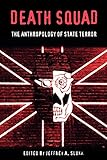Death Squad : The Anthropology of State Terror / ed. by Jeffrey A. Sluka.
Material type: TextSeries: The Ethnography of Political ViolencePublisher: Philadelphia : University of Pennsylvania Press, [2010]Copyright date: ©2000Description: 1 online resource (264 p.) : 8 illusContent type:
TextSeries: The Ethnography of Political ViolencePublisher: Philadelphia : University of Pennsylvania Press, [2010]Copyright date: ©2000Description: 1 online resource (264 p.) : 8 illusContent type: - 9780812217117
- 9780812200485
- 303.6/25
- HV6431 ǂb D433 2000eb
- online - DeGruyter
- Issued also in print.
| Item type | Current library | Call number | URL | Status | Notes | Barcode | |
|---|---|---|---|---|---|---|---|
 eBook
eBook
|
Biblioteca "Angelicum" Pont. Univ. S.Tommaso d'Aquino Nuvola online | online - DeGruyter (Browse shelf(Opens below)) | Online access | Not for loan (Accesso limitato) | Accesso per gli utenti autorizzati / Access for authorized users | (dgr)9780812200485 |
Browsing Biblioteca "Angelicum" Pont. Univ. S.Tommaso d'Aquino shelves, Shelving location: Nuvola online Close shelf browser (Hides shelf browser)

|

|

|

|

|

|

|
||
| online - DeGruyter Writing "Huck Finn" : Mark Twain's Creative Process / | online - DeGruyter Feudal Society in Medieval France : Documents from the County of Champagne / | online - DeGruyter Parades and the Politics of the Street : Festive Culture in the Early American Republic / | online - DeGruyter Death Squad : The Anthropology of State Terror / | online - DeGruyter The Transmission of Culture in Early Modern Europe / | online - DeGruyter The Laws of the Salian Franks / | online - DeGruyter The Book of Sainte Foy / |
Frontmatter -- Contents -- Illustrations -- Preface -- Introduction. State Terror and Anthropology -- Chapter 1. A Fictional Reality Paramilitary Death Squads and the Construction of State Terror in Spain -- Chapter 2. Trials by Fire. Dynamics of Terror in Punjab and Kashmir -- Chapter 3. State Terror in the Netherworld. Disappearance and Reburial in Argentina -- Chapter 4. The Homogenizing Effects of State-Sponsored Terrorism. The Case of Guatemala -- Chapter 5. "For God and Ulster". The Culture of Terror and Loyalist Death Squads in Northern Ireland -- Chapter 6. Ninjas, IManggalas, Monuments, and Mossad Manuals. An Anthropology of Indonesian State Terror in East Timor -- Chapter 7. Murdered or Martyred? Popular Evaluations of Violent Death in the Muslim Separatist Movement in the Philippines -- Chapter 8. Parents and Their Children in Situations of Terror. Disappearances and Special Police Activity in Punjab -- Conclusion. Death Squads and Wider Complicities. Dilemmas for the Anthropology of Violence -- Contributors -- Index
restricted access online access with authorization star
http://purl.org/coar/access_right/c_16ec
"There is real personal danger for anthropologists who dare to speak and write against terror; by doing so, they potentially and sometimes actually bring the terror down on themselves."-Jeffrey A. Sluka, from the IntroductionDeath Squad is the first work to focus specifically on the anthropology of state terror. It brings together an international group of anthropologists who have done extensive research in areas marked by extreme forms of state violence and who have studied state terror from the perspective of victims and survivors. The book presents eight case studies from seven countries-Spain, India (Punjab and Kashmir), Argentina, Guatemala, Northern Ireland, Indonesia, and the Philippines-to demonstrate the cultural complexities and ambiguities of terror when viewed at the local level and from the participants' point of view. Contributors deal with such topics as the role of Loyalist death squads in the culture of terror in Northern Ireland, the three-tier mechanism of state terror in Indonesia, the complex role of religion in violence by both the state and insurgents in Punjab and Kashmir, and the ways in which "disappearances" are used to destabilize and demoralize opponents of the state in Argentina, Guatemala, and India.
Issued also in print.
Mode of access: Internet via World Wide Web.
In English.
Description based on online resource; title from PDF title page (publisher's Web site, viewed 24. Apr 2022)


